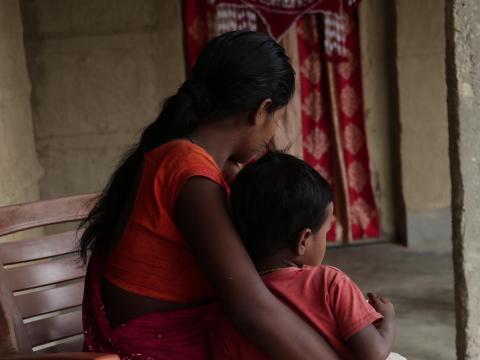"They say that girls are someone else's property"

In Nepal, approximately 33% of girls are married before their 18th birthday and 8% are married before the age of 15. Chadani, 18, was one of them.
When she was 14, her parents arranged her marriage. ‘We were a family of eight, and it was difficult to manage daily needs at home. When my mother informed me about my marriage, I felt very bad. All my friends of similar age were playing happily whereas I was going to get married.’
Girls in Chadani’s community are very restricted and do not have much agency. ‘In our society,’ she explains, ‘girls do not have the freedom to speak. They say that girls are someone else's property, and they are not allowed to have opinions.’
They are also rarely in school. Chadani herself has never been to school, even before her marriage. ‘People do not want to educate their daughters; they only send their sons to school. I haven't even seen a school up close; I don't even know what a copy or a pencil feels like. When I was a child, I dreamt of studying and becoming a successful person, but my dream never came true.’
Chadani hoped that at least after the marriage she might get a bit more freedom at her husband’s house — to be able to wear the clothes she wanted or maybe even to go to school. However, her hopes were quickly dashed.
‘My husband does not earn enough and I have not been able to eat nutritious food. I cannot even go to the hospital for the check-up. After marriage, my life has changed for the worse.’
Unlike in other countries in the study, married girls in Nepal are more likely to experience physical violence than their unmarried peers. ‘My in-laws used to beat me because I was just a child,’ Chadani adds.
‘I have a 3-year-old son and currently, I am six months pregnant. I do not want my children to suffer like I did. I will not allow my children to be married before 18. I want to raise them to be good citizens; I wish to provide my children with a good education. I have a dream they can be a doctor or an engineer in the future, but currently, even managing food is a problem because we don’t have enough money.’
A weak education system, harmful traditional beliefs, and malnutrition all help push girls and their families in Nepal into child marriage, even though under the Marriage Registration Act, the minimum legal age of marriage in Nepal is 20 years for girls and boys. World Vision is working in Chadani’s community and many others to end the practice by collaborating with local bodies and provincial governments to develop strategies to tackle the problem and working to empower young people both before and after they are married. We are also collaborating with faith leaders and religious networks like NIRN (National Inter-Religious Network) Nepal to connect with religious leaders from Muslim, Hindu, Buddhist, and Christian backgrounds, raising awareness of the Nepalese law and strictures from their own faith against child marriage.